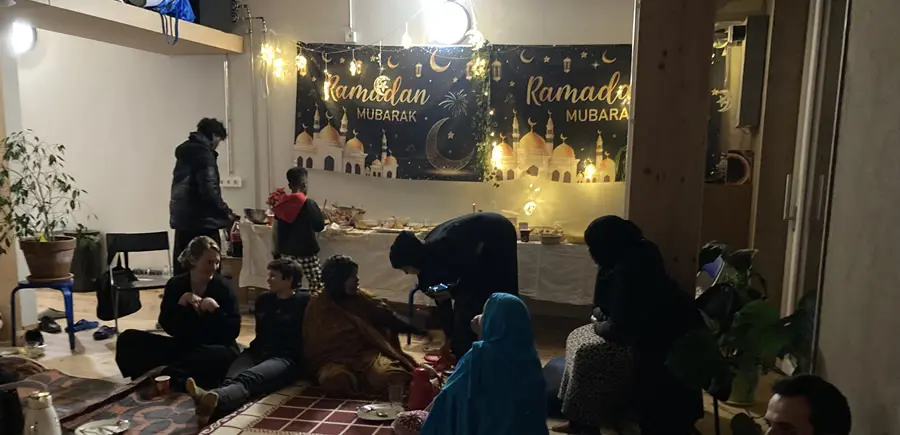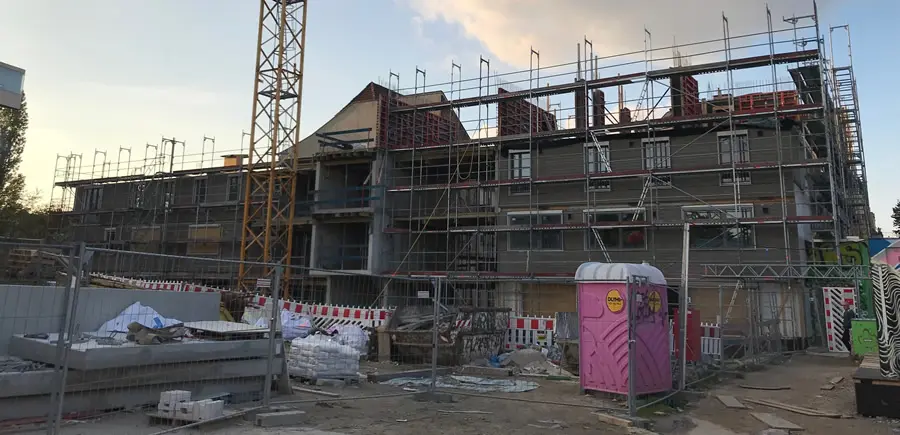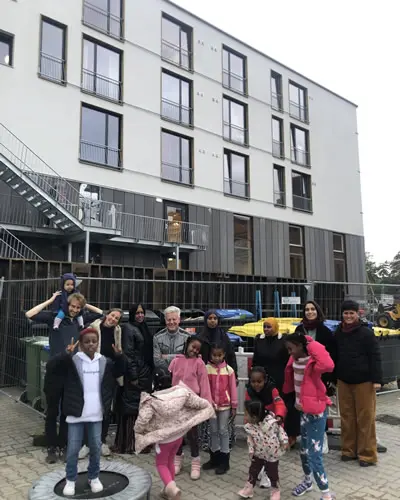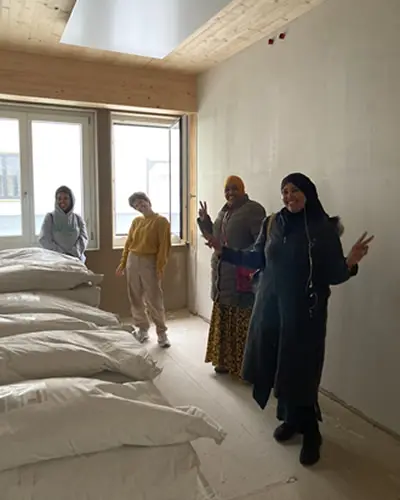WELCOME
Welcome to the trust foundation Beitragen statt Wegnehmen (Give not Take). On the following pages, you will find information about us and the work that we do. Please don't hesitate to contact us if you have any further questions, need more information or some advice. Thanks for your interest!

Basic concepts and guiding principles for the foundation's activities
We live in a performance-oriented society that operates on a principle of constant growth. While people in all areas of society realise that unrestrained competition and rampant growth have a destructive effect on the natural and social foundations of life, society nonetheless appears helpless in the face of increasing isolation (in society), exclusion (from society) and a privatised/privileged access to natural resources by the few. As patrons of this foundation, we are convinced that learning to behave in solidarity - with people and peoples - is an important contribution towards overcoming the current competitive struggle to secure a livelihood.
The aim of our foundation is therefore to support attempts in all spheres of life and work to promote equitable, solidary co-operation between people. We will initiate and consolidate social interaction, political exchange and economic co-operation between people who choose to become involved and who contribute equally. Jointly sharing, developing, using and experiencing are the central categories for action. We will actively oppose any exploitation of people or natural resources.
Donations by the founders and potentially by other supporters will increase the foundation's initial assets annually if our not-for-profit activities develop in a positive way and in accordance with the foundation's statutes. Longer-term, these extra donations should ensure that the economic success of our business people is used to promote solidarity and respectful social co-operation based on a sense of social responsibility.
How we work
The structure of the trust foundation will enable it to plan, develop and implement its own fields of work and activity. The founder and the appointed board, together with the trustee, will determine the practical orientation and co-ordinate implementation, thereby ensuring the success of the not-for-profit activities. For this reason, there are no plans for an application process to allot funding to projects.
If you can relate to the values of the Beitragen statt Wegnehmen (Give not Take) foundation and would like to support our work, please get in touch using the contact details provided.

Activity Reports
During the reporting year, the Foundation was able to continue its activities seamlessly, building on initiatives from previous years, particularly those that got underway in 2023. With the lifting of the remaining pandemic-related restrictions, the Foundation's goals could once again be advanced and strengthened through intercultural encounters and dialogue formats with children and adults, as well as through a diverse range of support and educational programmes.
The Foundation's main focus remained on further developing the intercultural neighbourhood, cultural, and housing project in Berlin's Neukölln district. In the autumn of the previous year, the partner organisation Campus Cosmopolis e.V., a nonprofit association, was able to move into suitable premises within a building complex on the site of the former Kindl Brewery at Rollberg, secured through a long-term general usage agreement. As outlined in detail in the 2023 activity report, the Foundation played a crucial role in ensuring the project's financial stability and, in doing so, made a significant contribution to its realization.
In addition to its financial contributions, the Foundation placed particular emphasis on providing project participants with substantive support, as well as on the conceptual development and delivery of services. The primary focus was on families with refugee backgrounds who, during this phase, required in-depth practical support and individual assistance. At the same time, the Foundation sought to actively shape and promote intercultural coexistence - whether in everyday life, at events, or within the neighbourhood setting. As in previous years, the Foundation was supported in this work by the steadfast commitment of numerous volunteers, whose dedication played a vital role in the successful implementation of the programme.
These central tasks required a large share of the Foundation's available resources. Nevertheless, the monthly intercultural encounter days were resumed. The focus remained on personal interaction, intercultural dialogue, and mutual practical support. In addition to individual events, two multi-day workshops were successfully conducted, both in the surrounding area and in Berlin-Wannsee. The workshops addressed topics such as immigration law, social legislation, housing, managing a household budget, social participation, digital technologies, and childcare services. In addition, participants were able to acquire practical skills in crafts, agriculture, and household management. The intercultural makeup of the group played a key role in fostering social integration. Furthermore, activities that actively involved the local neighbourhood were supported.
The demand for expert advice from other non-profit organisations remains consistently high. Many projects and their staff show strong interest in the intercultural expertise of the Foundation and seek to apply this knowledge in their own work. They are particularly interested in the areas of project establishment, concept development, organisational growth, and funding. To address these needs, well-established formats are now in place, including short training sessions, practical visits, job shadowing, as well as consulting and training meetups.
It is especially noteworthy that all activities were once again planned, prepared, and carried out by a professionally qualified and highly committed team of volunteers. Volunteering continues to form the cornerstone of the Foundation's work. Consequently, no personnel costs were incurred during the reporting year - a circumstance that provides the Foundation with an exceptionally high degree of both financial and creative freedom. The same applies to rental and facility expenses: the Foundation was once again able to deliver its programmes thanks to the generous provision of suitable spaces - either free of charge or at reduced rates-by non-profit organisations and private individuals in Berlin and the surrounding area.
Since its establishment, the Foundation Board has consistently pursued the principle of mission investing: all financial commitments are made exclusively in line with charitable and public welfare objectives. The careful selection of contractual partners also indirectly contributes to the efficient implementation of the Foundation's goals. As in previous years, the Foundation's assets were further strengthened through additional donations. Thanks to prudent and forward-looking budget planning, the Foundation will continue to have a solid financial basis for all activities in the coming years.
In 2023, the Foundation was once again able to carry out its work in a more personal and focused way, largely free from the restrictions of the Covid pandemic. This allowed us to pursue our goals much more freely - through intercultural exchange, direct dialogue, and various educational and support programmes.
As in previous years, a key focus of the Foundation's efforts was the development of a project that would create a space for intercultural living, working, and everyday interactions. After several unsuccessful attempts in the past, the Foundation was finally able to help secure a lease on a suitable property for this purpose during 2023.
In November 2022, initial exploratory discussions began regarding the potential use of a building complex on the site of the former Kindl Brewery on Rollberg in Berlin's Neukölln district. These talks continued in spring 2023.
The Foundation's long-standing partner, the non-profit association Campus Cosmopolis e.V., entered into concrete negotiations with the building cooperative TRNSFRM eG, which holds the long-term lease for the buildings and has its headquarters on-site. The property itself is owned by the Swiss non-profit Edith Maryon Foundation. When one of TRNSFRM eG's contractual partners unexpectedly withdrew shortly before the building's completion due to financial difficulties, the cooperative was forced to quickly find a replacement. This led to several months of in-depth negotiations with the cooperative aimed at establishing a sustainable legal, organisational, and financial framework that would allow Campus Cosmopolis e.V. to step in and replace the organisation that had dropped out. In the summer, Campus Cosmopolis e.V, the sponsor of the overall project, was finally able to conclude a general usage agreement for the building, which has around 1,300 square metres of residential and other floor space. By acquiring a cooperative share, granting a loan, and entering into a silent partnership, the Foundation made a crucial contribution to bringing the project to completion and getting the building ready for occupancy.
Alongside the financing and negotiations, work on the conceptual and structural design of the new intercultural neighbourhood, housing, and cultural project began in late summer. This phase also involved the selection of participants and the provision of sustained advice and support, particularly for refugees, who required extra support in navigating daily life and their new living environment. Once again, the Foundation was able to draw on the impressive commitment of numerous volunteers, whose dedication played a key role in successfully launching the project and ensuring that all residents were able to move in by the end of the year.
Notwithstanding the considerable resources that went into this large-scale project, key activities from previous years were continued, albeit on a reduced scale. Intercultural encounter days continued to be held at least once every two months, and three workshops provided additional educational opportunities. Intercultural encounter days still took place every two months, and three workshops offered educational opportunities. And to deliver these projects, the Foundation was once again able to draw on the expertise of qualified specialists, all of whom work on a voluntary basis.
The focus of all this work remained unchanged: fostering social and practical skills required for negotiating everyday life, promoting intercultural and socio-political dialogue, and sharing knowledge that enables people to lead a self-determined life - particularly families with children. In this way, the Foundation continues to contribute actively to combating discrimination and xenophobia. Other non-profit organisations have also shown strong interest in the Foundation's expertise. There remains significant demand for comparing notes, especially in the areas of the establishment and conception, organisational development, and project funding. To meet this need, the Foundation's volunteers developed and delivered tailored information and training formats.
The Foundation once again benefited from the provision of suitable premises free of charge, thanks to the support of numerous initiatives and groups. This made it possible to keep rental costs to a minimum. Combined with the continued absence of personnel expenses, the Foundation enjoys considerable financial and operational freedom-a notable advantage compared with many other organisations in this field. Finally, in addition to donations received, both the income from the Foundation's endowment and a particularly generous private contribution ensured that the 2023 financial year closed with a significant surplus. Overall, 2023 was a highly successful year for the Foundation, offering excellent prospects for 2024.
This year, too, our work was impacted significantly by COVID-related restrictions and regulations. Even though all participants had become somewhat accustomed to the situation, many activities could not be implemented or only to a very limited extent.
After all, the educational programmes the Foundation offers our target groups are based on personal encounters, and personal exchange is indispensable if the Foundation wants to foster international understanding and an international mindset.
The focus this year remained on constructing a site for intercultural residence, work and everyday encounters.
Our application for a building plot in Baumschulenweg, in the district of Berlin Treptow-Köpenick - part of a tender process (a German "Konzeptverfahren") initiated by BIM Berliner Immobilienmanagement GmbH in 2021 - was up for decision.
The planning consortium Projekt Radix, founded together with the partner Genius Wohnungsbau Genossenschaft, suffered a setback at the beginning of the year. BIM awarded the contract to another applicant in the tender who had offered a higher rate of payment for the ground rent of the site. The planning consortium Projekt Radix only made it to second place.
The strenuous application process thus proved unsuccessful and the efforts to hold funds back for this purpose were ultimately in vain. As a result, the Foundation had to pay a high amount in custodian fees to credit institutions.
Later in the year the Foundation attempted to arrange a cooperation with the winner of the afore-mentioned tender.
As an alternative, the Foundation also intensified a contact that had been initiated in 2021 with the cooperative "Genossenschaft Selbstverwalteter Projekte (GSP eG)" in Berlin.
The Foundation discussed the possible acquisition of a plot of land for housing construction in the area of Wallensteinstrasse/Tannhäuserstrasse, in the district of Berlin Karlshorst.
The GSP had been in concrete purchase negotiations with the owner, Deutsche Bundesbahn, for some time. The Foundation was hoping to acquire an independent co-ownership share. Together with the initiator of the project, the non-profit association Campus Cosmopolis e.V., the Foundation held extensive negotiations on meaningful participation in the project, including the option of joining the GSP cooperative.
The Foundation carried out a successful support campaign to raise funds to be provided in the event of the acquisition.
Unfortunately, this project also failed, since the project partner GSP eG did not guarantee in the final version of the purchase agreement the necessary independence in the project development of the planned co-ownership share through the Foundation and the partner Campus Cosmopolis e.V. Moreover, it was not possible to eliminate critical risks (including the lack of a building permit for the building plot) in advance.
In November, the Foundation and its cooperation partner Campus Cosmopolis e.V. were approached by trnsfrm eG in Berlin - Neukölln. There is a new construction project on the site of the former Kindl brewery in Neukölln, Am Rollberg, which may be seeking new user groups.
Initial talks have been held and possibilities for future cooperation have been identified. Many questions about potential participation remain open, but as of the end of 2022 it had not been ruled out.
As in the previous year, the Foundation invested a large quantity of our available resources in the preparatory work described above, leaving fewer resources for other activities, such as fundraising.
In terms of content, the Foundation focused on advisory services for and with other non-profit organisations in the field of intercultural understanding and education.
The Foundation was able to continue to build on the efforts made in the previous year, for example advising and mentoring other initiatives in concept development, the start-up phase, organisational development and financing. There is still a great need for our experience and knowledge, as provided by our volunteers.
The Foundation also received requests from already existing non-profit organisations at the end of the year.
Our volunteers and our cooperation partners prepared, organised and carried out four workshops on intercultural education and encounters. The topics have not changed during the past years. In addition to teaching everyday and social skills, the Trust Foundation primarily aims to promote intercultural and socio-political exchange.
In this way, too, the Foundation seeks to bring about a reduction in xenophobia and discrimination in society. To this end, the Foundation continues to work together with other civil society actors in a binding network.


Contact
Treuhandstiftung Beitragen statt Wegnehmen (gemeinnützig)
Richardstr. 99
12043 Berlin
E-Mail: ![]()
Treuhandstiftung Beitragen statt Wegnehmen: Download PGP-Key

